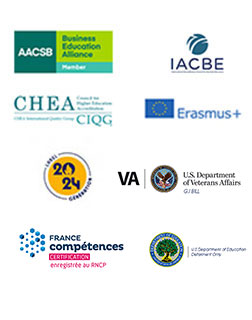
Flexible curricula, huge research budgets, exceptional university campuses, tutoring, an efficient integration system, and a whole lot of Nobel Prize winners! These are just a few of the many things that make the American education system one of the best (if not the best) in the world. Let’s dive into the reasons that make the United States one of the world leaders in education!

In France, almost everyone knows Harvard, Yale or Princeton. What we are less aware of is the great diversity of American universities. There are more than 5,500 recognized institutions of higher education in the United States, of which only 300 award doctorates. These 300 universities, known as “research universities,” are the ones to be credited for the universal reach of the American education system. But they are not the only ones. Other universities, which do not necessarily award doctorates, regularly classify as the best institutions in the country (Dartmouth, Williams, Amherst…), and attract many international students every year.
Here is some food for thought: 9 out of the 10 universities in the world with the most Nobel Prize winners are located in the United States! This is the undeniable, irrefutable proof of the great success of the American educational system. Better still, the first 9 places of this top 10 world universities having “given birth” to the largest number of Nobel Prize winners are occupied by American institutions. Here are a few examples:
The number of international students in the United States reached a record high for the 2018/2019 academic year, the fourth consecutive year with more than 1 million international students. The total number of international students, 1,095,299, is up 0.05% from the previous year, according to the Open Doors 2019 report on international educational exchange. International students make up 5.5% of the total U.S. higher education population. According to U.S. Department of Commerce data, international students contributed $44.7 billion to the U.S. economy in 2018, a 5.5% increase over the previous year.
For the tenth consecutive year, China remained the largest source of international students in the United States in 2018/2019, with 369,548 students in undergraduate, graduate, no-degree and elective practical training (ETP) programs, an increase of 1.7% from 2017/2018. India (202,014, +2.9%), South Korea (52,250, -4.2%), Saudi Arabia (37,080, -16.5%) and Canada (26,122, +0.8%) complete the top 5. Emerging countries experienced some of the strongest year-on-year growth, notably Bangladesh (+10%), Brazil (+9.8%), Nigeria (+5.8%) and Pakistan (+5.6%).
Marie Royce, Assistant Secretary of State for Educational and Cultural Affairs, explains it implicitly: “Promoting international student mobility remains a top priority for the Office of Educational and Cultural Affairs, and we want even more students in the future to consider the United States as the best destination for graduation. International exchange makes our colleges and universities more dynamic for all students, and an education at a U.S. institution can be transformative for students.
It is a known fact that many international students, when they can afford it, choose to study at American universities. We emphasize the issue of affordability because studying in the United States is expensive. Tuition fees at U.S. universities, especially at private institutions, average around $15,000 (in 2019). This compares to $5,000 in Australia, $4,000 in New Zealand, $3,800 in the United Kingdom and less than $2,000 in Canada.
The American Business School of Paris offers you an international curriculum based on the American educational system, which has proven to be the best academic system in the world. You will have the opportunity to obtain double recognition with the BBA (Bachelor of Business Administration) program, an internationally accredited 4-year American degree. This degree is delivered by the American Business School of Paris with the possibility of obtaining a double degree from an American partner university. The advantages of the double degree are numerous, in particular the fact that it provides dual professional skills for the learners, an undeniable added value on the job market.